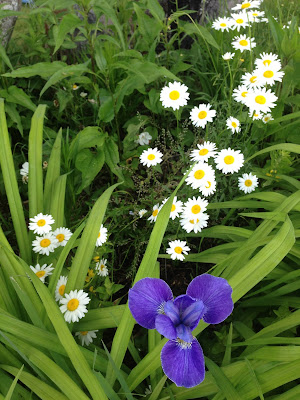Fort Whyte Alive is an extraordinary space in Winnipeg; originally quarry and clay mine for the Canada Cement Company, the land has been reclaimed and since the 1950s and in the 80s
the Fort Whyte Foundation with a focus on environmental education was established. There are wetlands, forest and grassland with a network of trails and programming and I was fortunate enough to be the summer camp director in 1995.
Now I am proud to have be a part of their innovative "Naturescape" program. To grossly paraphrase their brochure, the program encourages people to increase biodiversity in their own backyard. They actually pay me to do it, by giving me a $20 coupon for their gift shop, as well as discounts from major garden shops across the city. Below are the conditions I had to meet, which I hope makes it clear that the program is fairly accessible with a little planning.
Section 1: Clean Water, at least 2 sources
(Birdbath; backyard pond; drippers, spitters, or decorative pots and barrel
containing water; damp spot for butterflies)
Small recirculating water feature on cantina wall
Decorative fountain
Bird bath
Section 2: Food For All Seasons, at least 5
Spring/Summer
(Nectar feeder; 3 types of nectar plants; Flowering trees, shrubs or perennials ; Rotting fruit feeder for birds or butterflies; Organic garden, a food source for your family!)
Nectar feeder
3 types of nectar plants (Rudbeckia, Coneflower, Milkweed)
Perennials for pollinators (Blanket Flower & Helenium)
Organic garden (I prefer perennial fruits over vegetables)
Fall/Winter
(Birdfeeder; Nut or suet feeder; Seed or nut bearing trees and shrubs; Seed bearing perennials left through the winter; Tree, shrub or vine that retains its fruit/berries
into the winter months; Vines such as Virginia creeper and riverbank grape)
Birdfeeder
Suet feeder
Birdfeeder
Seed bearing Japanese Lilac tree
Seed bearing perennial left through the winter
Grape vine that retains fruit through winter
Year-round
(Compost bin [food source for decomposers]; An area of undisturbed leaf litter under trees or shrubs)
3: Shelter
1 of: Plant a native tree or two; Layered planting (Tree layer, shrub layer, ground layer); Thicket (tangled cluster of tall and medium
height shrubs)
Layered planting
+ 2 of: Evergreen tree; Hedge; Nesting cavity in a tree; Wood or brush pile; Rock pile or open stone wall; Nest box or nesting platform; Old log or snag (standing dead tree); Winter roosting box for birds; Bat roosting box
Nest box
Snag (standing dead tree)
Hedge
Evergreens
When my all-weather placard arrives I will proudly place it in front of my home for curious passerby, in order to help promote this worthwhile program.
***


























































